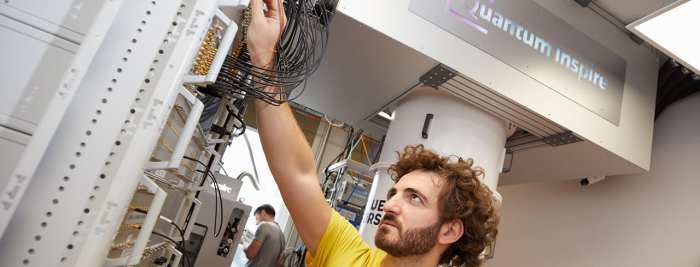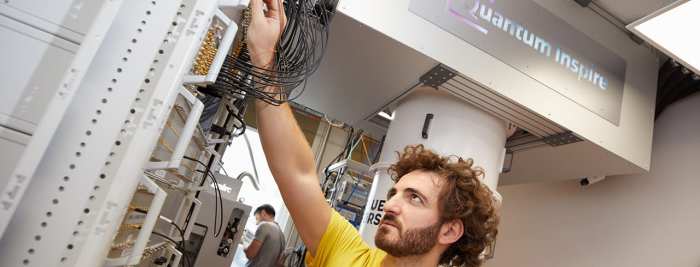Eu launches project bring quantum startups from lab to market – EU Launches Project to Bring Quantum Startups to Market: The European Union is taking a bold step to accelerate the development and adoption of quantum technologies by launching a new initiative designed to bridge the gap between research labs and the market.
This project aims to foster a thriving ecosystem for quantum startups, providing them with the necessary funding, support, and resources to bring their groundbreaking innovations to life.
The EU recognizes the transformative potential of quantum technologies across various sectors, from healthcare and materials science to finance and cybersecurity. By supporting the growth of quantum startups, the EU hopes to establish itself as a global leader in this rapidly evolving field, driving technological advancements and economic prosperity.
The EU’s Quantum Leap

The European Union (EU) has recognized the transformative potential of quantum technologies and has embarked on a strategic initiative to foster a robust quantum technology ecosystem. This initiative aims to position Europe as a global leader in quantum research, development, and innovation.
The Significance of the “Lab-to-Market” Transition
The transition of quantum startups from the laboratory to the market is a crucial step in realizing the full potential of these technologies. Quantum technologies are still in their early stages of development, and many challenges need to be addressed before they can be widely adopted.
These challenges include:
- Scaling up quantum systems:Current quantum systems are typically small and fragile, making it difficult to scale them up to meet the demands of real-world applications.
- Developing robust and reliable quantum hardware:The development of robust and reliable quantum hardware is essential for ensuring the accuracy and stability of quantum systems.
- Developing quantum algorithms and software:Quantum algorithms and software are necessary to harness the power of quantum computers and other quantum devices.
- Building a skilled workforce:A skilled workforce is essential for the development and deployment of quantum technologies.
- Addressing ethical and societal implications:The development of quantum technologies raises ethical and societal implications that need to be addressed.
The EU’s initiative to support the transition of quantum startups from the lab to the market aims to address these challenges and accelerate the development and adoption of quantum technologies. This initiative provides funding, support, and guidance to help quantum startups overcome the hurdles they face in commercializing their technologies.
Check what professionals state about analysis europe quantum sector poised massive growth and its benefits for the industry.
The Potential Impact on Europe’s Technological Competitiveness
The EU’s quantum initiative has the potential to significantly enhance Europe’s technological competitiveness. Quantum technologies are expected to revolutionize various industries, including healthcare, finance, materials science, and artificial intelligence. By fostering a vibrant quantum ecosystem, the EU aims to:
- Create new industries and jobs:The development and deployment of quantum technologies will create new industries and jobs in Europe.
- Enhance European competitiveness:By developing and deploying quantum technologies, Europe can enhance its competitiveness in the global economy.
- Strengthen Europe’s technological leadership:The EU’s quantum initiative aims to position Europe as a global leader in quantum technologies.
The success of the EU’s quantum initiative will depend on the ability to attract and retain talent, foster collaboration between academia, industry, and government, and address the ethical and societal implications of quantum technologies. The EU’s commitment to supporting the transition of quantum startups from the lab to the market is a crucial step in realizing the full potential of these transformative technologies.
Funding and Support for Quantum Startups: Eu Launches Project Bring Quantum Startups From Lab To Market
The EU’s Quantum Leap initiative recognizes the critical role of startups in translating groundbreaking quantum research into real-world applications. To foster this transition, the project provides a comprehensive suite of financial and non-financial support mechanisms specifically tailored to the needs of early-stage quantum ventures.
Financial Support Mechanisms
The EU’s Quantum Leap project offers a variety of financial support mechanisms designed to provide quantum startups with the resources they need to develop their technologies, scale their operations, and bring their products to market. These mechanisms include:
- Grants:The EU provides direct grants to quantum startups through competitive calls for proposals. These grants can be used to fund research and development activities, proof-of-concept projects, pilot deployments, and market entry strategies.
- Equity Investments:The EU also invests in quantum startups through venture capital funds and other equity investment vehicles. These investments provide startups with capital for growth, expansion, and commercialization efforts.
- Loan Guarantees:To further mitigate risk and enhance access to financing, the EU offers loan guarantees to quantum startups. These guarantees make it easier for startups to secure bank loans, providing them with working capital and operational flexibility.
Non-Financial Support Mechanisms
Beyond financial support, the EU’s Quantum Leap project offers a range of non-financial support mechanisms that provide quantum startups with valuable resources and guidance:
- Mentorship and Coaching:The project connects quantum startups with experienced mentors and coaches from industry, academia, and investment communities. These mentors provide guidance on business development, technology commercialization, and navigating the complex startup ecosystem.
- Networking Opportunities:The EU facilitates networking events and workshops, connecting quantum startups with potential investors, partners, customers, and other stakeholders. These events provide valuable opportunities for startups to build relationships, explore collaborations, and gain exposure to the broader quantum community.
- Access to Infrastructure:The EU provides quantum startups with access to state-of-the-art research infrastructure and facilities. This access enables startups to test and validate their technologies, conduct advanced research, and accelerate their development timelines.
Selection Criteria for Funding and Support
To ensure that funding and support are allocated to the most promising quantum startups, the EU has established rigorous selection criteria. These criteria typically include:
- Technical Innovation:The startup’s technology must demonstrate a high level of innovation and potential for disruptive impact in the quantum space. This includes the originality of the technology, its scientific validity, and its potential to address significant market challenges.
- Market Viability:The startup’s business model must be sound and demonstrate a clear path to commercialization. This includes a thorough understanding of the target market, the potential customer base, and the competitive landscape.
- Team Expertise:The startup’s team must possess a strong track record in quantum science, engineering, business development, and other relevant areas. This includes the technical expertise, entrepreneurial skills, and leadership qualities of the team members.
- Potential for Impact:The startup’s technology and business model must have the potential to create significant societal or economic impact. This includes the potential for job creation, economic growth, and addressing pressing societal challenges through quantum solutions.
Examples of Programs and Initiatives
The EU’s Quantum Leap project has launched several specific programs and initiatives designed to accelerate the commercialization of quantum technologies. These include:
- Quantum Flagship:This large-scale research and innovation program provides funding for cutting-edge quantum research projects across Europe. It aims to foster the development of quantum technologies, including quantum computing, quantum communication, and quantum sensing.
- Eurostars:This program supports collaborative research and development projects between companies from different European countries. It encourages the development of innovative products and services with commercial potential, including quantum-based solutions.
- Horizon Europe:The EU’s flagship research and innovation program, Horizon Europe, includes dedicated funding streams for quantum technologies. These streams support projects that address specific challenges in quantum computing, communication, and sensing, with a focus on commercialization and market uptake.
Bridging the Gap
The transition from lab to market for quantum startups presents unique challenges. While the potential of quantum technologies is undeniable, translating theoretical breakthroughs into commercially viable products requires a delicate balance of scientific expertise, entrepreneurial spirit, and a deep understanding of market needs.
Industry Collaboration and Partnerships
Industry collaboration plays a crucial role in overcoming these challenges. By fostering partnerships between quantum startups and established companies, the EU can create a dynamic ecosystem that accelerates innovation.
- Access to Resources:Partnerships provide startups with access to resources, including funding, infrastructure, and expertise, which are often difficult to secure independently.
- Market Validation:Collaboration with established companies allows startups to test and validate their technologies in real-world scenarios, gaining valuable feedback and accelerating their path to market.
- Joint Development:Partnerships can facilitate the development of joint products and services, leveraging the strengths of both parties to create solutions that are more robust and commercially viable.
Market Applications and Impact
Quantum technologies have the potential to revolutionize various sectors, creating new opportunities and transforming existing industries.
- Drug Discovery and Materials Science:Quantum simulations can accelerate the development of new drugs and materials, leading to breakthroughs in healthcare and manufacturing.
- Financial Modeling and Risk Management:Quantum algorithms can enhance financial modeling and risk management, leading to more accurate predictions and improved decision-making.
- Cybersecurity:Quantum cryptography offers unprecedented levels of security, protecting sensitive data from future threats.
- Artificial Intelligence:Quantum computing can enhance machine learning algorithms, leading to more powerful and efficient AI systems.
The Future of Quantum Innovation in Europe

The EU’s ambitious project to bring quantum startups from the lab to the market holds immense promise for shaping the future of quantum innovation in Europe. This initiative has the potential to not only accelerate the development and deployment of quantum technologies but also to establish Europe as a global leader in this burgeoning field.
The Long-Term Impact of the EU Project on the Quantum Technology Landscape
The EU’s initiative to support quantum startups is poised to have a profound and lasting impact on the quantum technology landscape. By providing crucial funding and support, the project will foster the growth of a vibrant ecosystem of quantum companies, leading to:
- Accelerated Innovation:The project will accelerate the pace of quantum innovation by providing startups with the resources they need to develop and commercialize their technologies. This will lead to the emergence of new and disruptive quantum applications across various sectors.
- Increased Investment:The EU’s commitment to quantum startups will attract further investment from private and public sources, creating a virtuous cycle of funding and growth. This will bolster the development of quantum technologies and their adoption by businesses and society.
- Enhanced Competitiveness:By nurturing a thriving quantum ecosystem, the EU will strengthen its position as a global leader in quantum technology. This will enable Europe to compete effectively with other regions, such as the United States and China, in the race to develop and commercialize quantum technologies.
The Potential for Spin-offs and Advancements Driven by Supported Startups
The EU’s support for quantum startups will not only foster the growth of existing companies but also drive the creation of new spin-offs and advancements. This will result in a ripple effect of innovation and growth throughout the quantum technology landscape:
- New Technologies and Applications:Startups will explore novel applications of quantum technologies, leading to the development of new and innovative products and services. For example, a startup focused on quantum computing might develop a new algorithm for drug discovery, while another startup might create a quantum sensor for precision agriculture.
- Cross-Disciplinary Collaboration:The project will encourage collaboration between quantum startups and researchers from other disciplines, such as medicine, materials science, and finance. This cross-fertilization of ideas will lead to the development of innovative solutions to complex problems.
- Job Creation and Economic Growth:The growth of the quantum technology sector will create new jobs and stimulate economic growth. As quantum startups succeed, they will require more skilled workers, contributing to the development of a highly skilled workforce in Europe.
How the EU Can Continue to Nurture a Thriving Quantum Innovation Ecosystem, Eu launches project bring quantum startups from lab to market
To sustain and further strengthen the quantum innovation ecosystem in Europe, the EU should continue to:
- Provide Long-Term Funding:Sustained and predictable funding is essential for quantum startups to thrive. The EU should continue to provide long-term funding for research, development, and commercialization of quantum technologies.
- Foster Collaboration and Networking:Encouraging collaboration between startups, universities, and research institutions is crucial for driving innovation. The EU should support initiatives that facilitate networking and knowledge sharing within the quantum community.
- Develop Talent and Skills:A skilled workforce is essential for the success of the quantum technology sector. The EU should invest in education and training programs to develop a pipeline of talented quantum scientists, engineers, and entrepreneurs.
- Promote Public Awareness:Raising public awareness about the potential of quantum technologies is essential for their adoption. The EU should invest in initiatives that educate the public about quantum technologies and their benefits.





